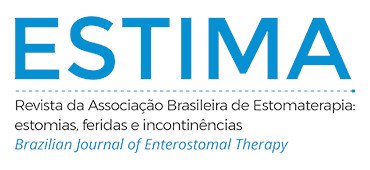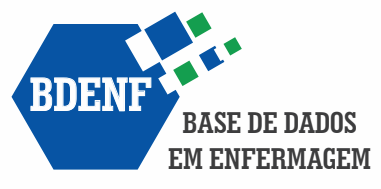Therapeutic ultrasound associated with essential oils of copaiba and tea tree for healing skin lesions
Abstract
Objective: to evaluate the effectiveness of low-frequency ultrasound associated with copaiba and tea tree oil gel in healing skin lesions. Method: quasi-experimental study with pre and post-tests in a single group, carried out in a public hospital in Ceará, Brazil, from March to September 2017, with 14 participants who received 10 treatment sessions. Results: there was an average reduction of more than 20 cm² from the 1st to the 5th application. The reduction in the initial size for the 10th session was over 50%. There was statistical significance (p = 0.0043) between the initial evaluation and the 10th therapy evaluation, with an average reduction of 37 cm². There was a reduction in the intensity of pain reported by the participants and 62.5% were free of pain after applying the therapy. Conclusion: the use of the gel with copaiba and tea tree oil points to an alternative coverage associated with biostimulators such as ultrasound. The composition of the gel oil helped in the application and in the reduction of the maceration of the edge of the wounds, as well as the control of the exudate of the lesion.
Downloads
Metrics
References
Ennis WJ, Lee C, Plumer M, Meneses P. Current status of the use of modalities in wound care: electrical stimulation and ultrasound therapy. Plastic Reconstr Surg 2011;127(1):93-102. https://doi.org/10.1097/PRS.0b013e3181fbe2fd
Alkahtani SA, Kunwar PS, Jalilifar M, Rashidi S, Yadollahpour A. Ultrasound-based Techniques as Alternative Treatments for Chronic Wounds: A Comprehensive Review of Clinical Applications. Cureus 2017;9(12):e1952. https://doi.org/10.7759/cureus.1952
Bagnato VS, Paolillo AR, João JP, Paolillo FR, João HA, Frascá D. Dois em um: dispositivo usa ultrassom e laser simultaneamente para reabilitar pacientes com artrose [Depoimento a Yuri Vasconcelos]. Pesquisa FAPESP. 2015; (229): 76-77.
https://revistapesquisa.fapesp.br/2015/03/13/dois-em-um/
Liakos I, Rizzello L, Scurr DJ, Pompa PP, Bayer IS, Athanassiou A. All-natural composite wound dressing films of essential oils encapsulated in sodium alginate with antimicrobial properties. Int J Pharm 2014; 463 (2):137–145. https://doi.org/10.1016/j.ijpharm.2013.10.046
Silva JK, Pinto LC, Burbano RM, Montenegro RC, Guimarães EF, Andrade EH, Maia JG. Essential oils of Amazon Piper species and their cytotoxic, antifungal, antioxidant and anti-cholinesterase activities. Ind Crops Prod 2014;58(2):55–60. https://doi.org/10.1016/j.indcrop.2014.04.006
Kavoosi G, Rahmatollahi A, Dadfar SMM, Purfard AM. Effects of essential oil on the water binding capacity, physicomechanical properties, antioxidante and antibacterial activity pf gelatina flims. LWT Food Sci. Technol 2014, 57 (2):556-561. https://www.academia.edu/19953566/Effects_of_essential_oil_on_the_water_binding_capacity_physico-mechanical_properties_antioxidant_and_antibacterial_activity_of_gelatin_films
Pires VGA, Moura MR. Preparação de novos filmes poliméricos contendo nanoemulsões do óleo de melaleuca, copaíba e limão para aplicação como biomaterial. Quim Nova 2017; 40(1): 1-5. https://doi.org/10.21577/0100-4042.20160130
Guimarães NG, Pires-De-Campos MS, Leonardi GR, Dib-Giusti HHK, Polacow MLO. Efeito do ultrassom e do dexapantenol na organização das fibras colágenas em lesão tegumentar. Rev Bras Fisioter 2011; 15 (3): 227-32. http://www.scielo.br/pdf/rbfis/v15n3/09.pdf 9. Santo PFE, Almeida AS, Silveira MM, Salomé GM, Ferreira LM. Use of the Pressure Ulcer Scale for Healing tool to evaluate the healing of chronic leg ulcers. Rev Bras Cir Plást 2013; 28 (1):133-141. https://doi.org/10.1590/S1983-51752013000100023
Liedke DCF, Johann DA, Danski MTR. Consultório de enfermagem para tratamento de feridas em hospital de ensino. Cogitare Enferm 2014; 19 (3): 590-6. http://dx.doi.org/10.5380/ce.v19i3.34486
Miller DL, Smith NB, Bailey MR, Czarnota GJ, Hynyen K, Makin INRS. Overview of therapeutic ultrasound applications and safety considerations. J Ultrasound Med 2012;31(4):623-34. http://dx.doi.org/10.7863/jum.2012.31.4.623
Mostafa YAJ, Zohre R, Samaneh R. Electromagnetic fields and ultrasound waves in wound treatment: a comparative review of therapeutic outcomes. Biosci Biotech Res Asia 2015; 12 (suplemento 1): 185-195. http://dx.doi.org/10.13005/bbra/1622
Wang R, Feng Y, DI B. Comparisons of negative pressure wound therapy and ultrasonic debridement for diabetic foot ulcers: a network meta-analysis. Int J Clin Exp Med 2015; 8 (8): 12548-56. https://www.ncbi.nlm.nih.gov/pmc/articles/PMC4612850/pdf/ijcem0008-12548.pdf
Korelo RIG, Fernandes LC. Ultrassom terapêutico para cicatrização de feridas: revisão sistemática. ConScientiae Saúde 2016;15(3):518-529. https://doi.org/10.5585/conssaude.v15n3.6421
Marinho DF, Oliveira ECP, Araújo JAS, Pinto IF, Lima HS, Moraes WP, Ambrósio CE, Morini AC. Avaliação da transmissibilidade ultrassônica do gel fitoterápico de Copaifera duckei Dwyer. Pesq Vet Bras 2017; 37(5):516-520. https://doi.org/10.1590/s0100-736x2017000500015
Martins IFB, Silva A. Influência do óleo de copaíba (copaifera sp.) no tratamento de ferida cutânea infeccionada. Rev pesq cuid fundam online 2010; 2 (Ed. Supl.):526-529. http://dx.doi.org/10.9789/2175-5361.rpcfo.v0.976
Tobouti PL, Mussi MCM, Rossi DCP, Pigatti FM, Taborda CP, de Assis Taveira LA, Sousa SCOM. Influence of melaleuca and copaiba oils onCandida albicansadhesion. Gerodontology 2014; 33(3), 380–385. https://doi.org/10.1111/ger.12172 18. Wiegand C, Bittenger K, Galiano RD, Driver VR, Gibbons GW. Does noncontact low-frequency ultrasound therapy contribute to wound healing at the molecular level? Wound Repair Regen 2017;25(5):871-882. https://doi.org/10.1111/wrr.12595
Chang YR, Perry J, Cross K. Low-Frequency Ultrasound Debridement in Chronic Wound Healing: A Systematic Review of Current Evidence. Plast Surg (Oakv) 2017; 25(1):21-26. https://doi.org/10.1177/2292550317693813
Lee WS, Park ES, Kang SG, Tak MS, Kim CH. Successful Treatment of Recalcitrant Remaining Postoperative Wounds by Dual-Frequency Ultrasound. Med Laser 2018; 7(2): 74-78. https://doi.org/10.25289/ML.2018.7.2.74
Chen L, Zheng Q, Chen X, Wang J, Wang L. Low frequency ultrasound enhances vascular endothelial growth factor expression, thereby promoting the wound healing in diabetic rats. Exp Ther Med 2019; 18(5): 4040–4048. https://doi.org/10.3892/etm.2019.8051
Samuels JA, Weingarter MW, Margolis DJ, Zubkov L, Sunny Y, Bawiec CR, et al. Low-frequency (<100 kHz), low-intensity (<100 mW/cm²) ultrasound to treat venous ulcers: a human study and in vitro experiments. J Acoust Soc Am 2013; 134 (2): 1541-7. https://doi.org/10.1121/1.4812875
Olyaie M, Rad FS, Elahifar MA, Garkaz A, Mahsa G. High-frequency and noncontact low-frequency ultrasound therapy for venous leg ulcer treatment: a randomized, controlled study. Ostomy Wound Manage 2013; 59 (8): 14-20. https://www.ncbi.nlm.nih.gov/pubmed/23934374
Wollina U, Heinig B, Naumann G, Scheibe A, Schmidt WD, Neugebauer R. Effects of low-frequency ultrasound on microcirculation in venous leg ulcers. Indian J Dermatol 2011;56(2):174–179. https://doi.org/10.4103/0019-5154.80412
Nascimento LA, Cardoso MGC, Oliveira SA, Quina E, Sarinha DSS. Manuseio da dor: avaliação das práticas utilizadas por profissionais assistenciais de hospital público secundário. Rev Dor 2016; 17 (2): 76-80. https://doi.org/10.5935/1806-0013.20160019
Downloads
Published
How to Cite
Issue
Section
License
Copyright (c) 2020 Darrielle Gomes Alves Mororó, Maria Girlane Sousa Albuquerque Brandão, Vanessa Aguiar Ponte, Alan Sidney Jacinto da Silva, Francisco Walyson da Silva Batista, Vivian Saraiva Veras, Thiago Moura de Araújo

This work is licensed under a Creative Commons Attribution 4.0 International License.

























